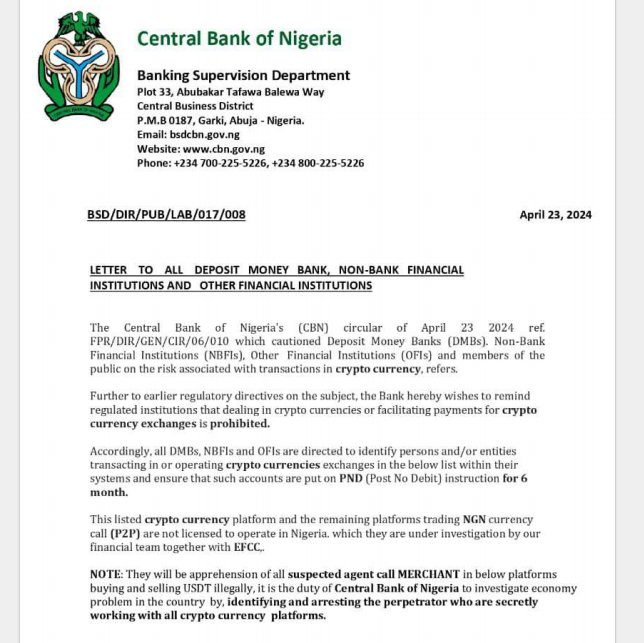More recent news has surfaced about a purported memo from the Central Bank of Nigeria (CBN). This memo reportedly advised financial institutions to cease dealing with cryptocurrencies and to stop facilitating transactions for crypto exchanges.
Four months ago, Nigeria removed the restriction that prohibited banks and financial institutions from maintaining accounts for virtual asset service providers (VASPs), causing concern with the recent news.
Latest Crypto Crackdown Turned Out A Bluff
On Taylor’s day, news emerged about the Central Bank of Nigeria (CBN) taking action against financial institutions supporting cryptocurrency trading platforms in Nigeria.
DMBs, NBFIs, OFIs, and the general public were advised by the alleged circular about the potential risks involved in cryptocurrency transactions.

The document reminded regulatory institutions that it is prohibited for them to handle cryptocurrencies or provide services for exchanges, as stipulated by previous regulatory guidelines.
Despite this, the imposed ban on dealing with cryptocurrencies was lifted in December 2023, bringing about stringent regulations under which banks and financial institutions could transact with them.
A supposed communication instructed DMBs, NBFIs, and OFIs to locate and disclose any individuals and businesses using their platforms for dealing with or managing cryptocurrencies through digital exchanges.
According to the given document, Binance, OKX, KuCoin, and Bybit are named as unauthorized exchanges. These platforms, along with any others facilitating trades of the Nigerian Naira in the Peer-to-Peer (P2P) market, do not hold the necessary licenses to conduct their operations within the country.
The CBN and EFCC were looking into these platforms, and as a result of this investigation, financial institutions were instructed to prevent any debits from accounts involved in dealing with cryptocurrencies for a period of six months.
Additionally, the notice cautioned that individuals dealing with “USDT in an unlawful manner” may face arrest. The text indicated that infringement of the new regulations would lead to significant penalties for those concerned.
Despite reports to the contrary, Nigeria’s Central Bank confirmed on Wednesday that the circulated document was not genuine. In a social media post, the CBN clarified that the information did not come from their organization.
Nigeria’s EFCC Freezes 300 Accounts
Although the Central Bank of Nigeria’s circular was discovered to be false, the Economic and Financial Crimes Commission (EFCC) has seized control of more than 300 unlawful foreign exchange trading accounts operating on a Peer-to-Peer (P2P) platform recently.
Based on a recent local news article, EFCC Chairman Ola Olukoyede disclosed on Tuesday that the accounts in question were frozen on Monday in compliance with a judicial decree.
The Chairman revealed that the agency found a more problematic setup than Binance’s, which is under scrutiny in the country. The largest cryptocurrency exchange globally and two of its top officials are currently being investigated for tax evasion allegations in Nigeria.
According to the report, Olukoyede acknowledged that there are individuals in this country engaging in activities as detrimental as Binance’s. Consequently, measures were implemented to safeguard the forex market and shield the economy from potential harm.
Last year, more than 15 billion Nigerian Naira, equivalent to approximately $11 million, were processed through a peer-to-peer forex trading platform, which the Economic and Financial Crimes Commission (EFCC) views as an unofficial financial transaction.
Read More
- ENA PREDICTION. ENA cryptocurrency
- USD PHP PREDICTION
- SOL PREDICTION. SOL cryptocurrency
- BTC PREDICTION. BTC cryptocurrency
- SHIB PREDICTION. SHIB cryptocurrency
- Red Dead Redemption: Undead Nightmare – Where To Find Sasquatch
- USD COP PREDICTION
- LUNC PREDICTION. LUNC cryptocurrency
- USD ZAR PREDICTION
- BRISE PREDICTION. BRISE cryptocurrency
2024-04-25 07:11